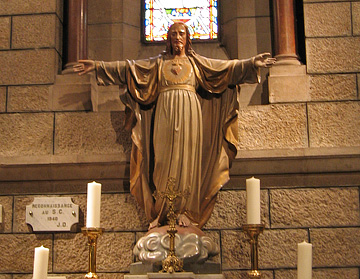One of the classic Jewish affirmations appears in the sixth chapter of Deuteronomy: “Hear, O Israel: The LORD our God, the LORD is one. Love the LORD your God with all your heart and with all your soul and with all your strength” (Deut 6:4-5, NIV). This is often called the Shema, Hebrew for the imperative “hear.” The Shema stood at the center of Jewish faith and worship in the time of Jesus, even as it does today. It affirmed the oneness of God, as well as the fact that this one God was also the Israel’s own LORD, the One who had revealed himself as Yahweh. (When “LORD” appears in all caps in the Bible, it translates the Hebrew name of God, YHWH. Photo: The Shema as it appears in the Siddur, the Jewish prayer book. I have circled the word shema’ in Hebrew.)
The Apostle Paul, having grown up in a committed Jewish family, would have heard the Shema countless times. Though the larger pagan world of his upbringing was filled with other so-called “gods,” Paul and his fellow Jews affirmed that theirs was the only true God, an affirmation that sometimes led to persecution of Jews, even occasional martyrdom. Yet no faithful Jew would abandon the belief in one God, the LORD, who was worthy to be loved with heart, soul, and strength. Jesus himself affirmed the importance of the Shema when he asked which commandment was the greatest: “The first is, ‘Hear, O Israel: the Lord our God, the Lord is one; you shall love the Lord your God with all your heart, and with all your soul, and with all your mind, and with all your strength” (Mark 12:29-30).
When he accepted Jesus as God’s Messiah, Paul continued to see himself as a faithful Jew. Yet his understanding of God began to change. Not only did he see the grace of God more clearly, but also he saw greater complexity in God’s own unique nature. This is evident in a passage from his first letter to the Corinthians, in a discussion focused on the question of whether or not Christians should eat food that had been sacrificed to idols. Here he writes:
Indeed, even though there may be so-called gods in heaven or on earth–as in fact there are many gods and many lords–yet for us there is one God, the Father, from whom are all things and for whom we exist, and one Lord, Jesus Christ, through whom are all things and through whom we exist (1 Cor 8:5-6).
Here, in Paul’s confession of one God, is a distinct echo of the Shema. Surely when a Jewish man wrote “yet for us there is one God,” the Shema was ringing in his ears. Unlike the pagans for whom there are many “gods,” for Paul and the Christians in Corinth there is “one god, the Father.” This is the God who created all things, and who gives us our purpose in living.
But then Paul adds something radically new in the history of Judaism. Not only is there one God, but also “one Lord, Jesus Christ.” As we have seen in my last two posts, once again Jesus is called “Lord.” The context makes it clear that Paul was not using this word merely in reference to a human worthy of respect. The Lord Jesus is the one “through whom are all things and through whom we exist,” not exactly something that would be said of a human being.
In 1 Corinthians 8, the relationship of Jesus Christ to God the Father is extraordinarily intertwined. Jesus not only receives God’s unique name of Lord, but also he is the agent through whom God created all things and all people. Thus Jesus has begun to take on the attributes of God’s Wisdom as portrayed in the Hebrew Scriptures and other ancient Jewish writings. In Proverbs, for example, as God creates the universe, Wisdom speaks in this way: “When [God] marked out the foundations of the earth, then I was beside him, like a master worker; and I was daily his delight, rejoicing before him always” (Prov 8:29-30). God created, but Wisdom was the master worker. In 1 Corinthians 8, all things come from God, but all things come through Jesus Christ the Lord.
This passage reveals that the early Christian confession of Jesus as Lord did not, in the minds of the early Christians, mean they had abandoned Jewish monotheism in favor of pagan polytheism. They still affirmed the existence of one God. Yet somehow this one God now includes the one Lord, Jesus Christ.
A critic would say that this is folly, that one God can’t include the one Lord, Jesus Christ. The early Christians would say that this is part of the mysterious nature of God. Later on, theologians would attempt to explain this mystery in more systematic terms, affirming that the one God exists in three persons (including the Holy Spirit). We can see the seeds of this Trinitarian theology in texts like 1 Corinthians 8. Though these seeds are of the tiny, mustard seed variety, nevertheless they show the beginning of Christian reflection on the nature of God and Christ, that which led to full-blown Trinitarianism in the fourth and fifth centuries A.D.
So far in this series we’ve seen that the earliest Christians addressed and referred to the risen Jesus as Lord, applying to him a name reserved for the God of Israel. They prayed to him (1 Corinthians 16:22). They envisioned his worship and no doubt worshiped him themselves (Phil 2:9-11). They related to him as if to God. Therefore, the idea that the divinization of Jesus was a late development apart from genuine Christianity fails to fit the evidence. On the contrary, the evidence suggests that some of the very earliest Christians regarded Jesus as far more than merely human. Moreover, this theological development happened, not under the influence of pagan polytheism, but while Christianity was still growing in the cradle of Judaism.
Why? Why did the earliest Christians, many of whom were faithful Jewish monotheists, regard Jesus as divine? What motivated them to regard the human Messiah as far more than human? I’ll seek to answer these questions in my next posts.

